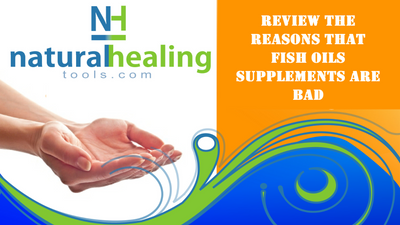Review the Reasons that Fish Oils are Bad
Mar 14th 2024
So many reasons to review why not to to take fish oil, let's get started.
- It takes 17 pounds of fish to make one fish oil capsule. While the fishing industry is important and fish are a natural resource, this is an extreme amount of catching of fish to make a product that is not good for us.
- When you consume fish oil capsules, you are giving your body a huge overdose of derivative fatty acids, and messing with your body's internal intelligence of what is the right amount of omega fatty acid derivatives (EPA and DHA) that it actually needs. The fact is, while there is a positive cumulative effect of taking the correct EFA's the intentional overdosing of fatty acids can cause cells to get confused and age prematurely.
- The fish required to make fish oil capsules are usually cold water fish. These fish tend to retain heavy metals in their bodies.
- To process fish oil into a capsule requires processing and cooking. These are the two parts of manufacturing that take away the good factors of a supplement or food - and leave the bad. Fish Oil capsules are just one of the worst products that suffer in manufacturing.
- PEOs® come from flax seeds. The growing of flaxseed is easy to renew and friendly to the environment. The oil is expelled and the rest of the seed is used in other foods. With seed oils, one's body can get all the benefits of Parent Omega Oils, for skin health, hormones, etc.
Many proponents of fish oil supplementation point to the very small conversion rates of parent omega oils to derivative omega oils in the human body as proof that fish oil supplementation is good, since the brain needs those derivative oils and since fish oil supplementation alleviates human cells of working to make those derivative oil conversions. They fail to inform the people whom they are misleading that:
- Small conversion rates from parent omega oils into derivative omega oils reflect the fact that the human body only needs very tiny amounts of derivative omega oils.
- They also fail to inform their audiences that effective conversion of parent omega oils into derivative omega oils will naturally occur in people whose cells have adequate amounts of catalyzing nutrients, especially Vitamin B6, Vitamin C, Magnesium, and Zinc.
- If an individual doesn't have enough derivative Omega oils in their body the reason is not that they haven't been swallowing enough fish oil, but rather than they haven't consuming enough catalyzing nutrients (especially minerals) and undamaged parent Omega oils.
- The above spotlights the "erroneous thinking" of fish oil proponents who would rather kill half the fish in the ocean in order to increase people's derivative Omega oils unnecessarily rather than have people eat seed oils and common nutrients that would ensure their bodies could naturally make all the derivative Omega oils that are needed by their bodies. Also, these erroneous thinking would have people forego the parent Omega oils that provide numerous benefits that derivative omega oils don't provide.
It does seem a bit confusing but the bottom line is - fish oil is an over-processed, under-balanced supplement choice. While the medical community wants us to get more Omega 3, Omega 6 and derivative oils in our diet, it is critical we get the correct daily balance of these essential supplements plus balance the other catalyzing nutrients so that the absorption and use of the Omegas is optimized.
If you are seeking YES EFA supplements, link here.

